The game is also out on pc gamepass.
You are using an out of date browser. It may not display this or other websites correctly.
You should upgrade or use an alternative browser.
You should upgrade or use an alternative browser.
Steam successes shaking up the traditional AAA model. *spawn
- Thread starter Cyan
- Start date
cheapchips
Veteran
The fascination is probably down to a couple of things. This gen's blockbuster titles have been more boring than ever, if you can even consider most of them next gen. The other is that the level of success for some of these smaller titles is dramatic. Gunpoint paid off Tom Francis's mortgage. Manor Lords will probably let Greg Styczeń become, er, lord of his own manor.
Johnny Awesome
Veteran
I'm happy for these small devs success, but AAA games are still needed and can be great as well. The idea that they're dying is ridiculous.
Are CoD and Fortnite dying? I don't think so.
No complaints about Spider-Man 2, Forza Horizon 5, or God of War either.
It's funny how the gaming press gets on these bandwagons. Last time it was GaaSlighting about GaaS games and now its the anti-AAA crusade. Click bait nonsense, mostly.
Are CoD and Fortnite dying? I don't think so.
No complaints about Spider-Man 2, Forza Horizon 5, or God of War either.
It's funny how the gaming press gets on these bandwagons. Last time it was GaaSlighting about GaaS games and now its the anti-AAA crusade. Click bait nonsense, mostly.
The fascination is probably down to a couple of things. This gen's blockbuster titles have been more boring than ever, if you can even consider most of them next gen. The other is that the level of success for some of these smaller titles is dramatic. Gunpoint paid off Tom Francis's mortgage. Manor Lords will probably let Greg Styczeń become, er, lord of his own manor.
I mean I know I'm old and have a lot of cobwebs but i bought doom shareware on a floppy disc and had to order the rest from ID . Pretty sure that paid off their mortgages or well a bunch of super cars.
This isn't anything new. What is new is the amount of people buying games and its ever easier to get those games and for people to find them and amplify their reach.
I found out about Doom on news groups but not many people were on those back in the day. By the time doom was picked up in magazines it was already out for at least a month. Now a game releases and people are starved for content and the game explodes if its big.
Look at some of these games more closely. Helldivers was a shit show. It had hour long ques if not longer to play. On pc it crashed all the time for weeks. Content in the game was extremely lacking when It launched. But the game play loop was fun and so people bought into it. content is still lacking. They introduced one new mission type for a few days and put out some war bonds that take only a few days to unlock all the content. BG3 was in early access for 3 years and still launched with tons of issues and the last act was an unoptimized loop. I am playing Manor lords now in early access on game pass and its missing a proper tutorial .
I believe that a lot of these games are getting boosted because twitch/youtube/kick and even the media sites move on negative news and the big publishers are easy targets. It's easy to hate blizzard and put out a bunch of videos about how bad over watch 2 is and how bad diablo 4 is . In the same vein its easy to boost small companies that no one knows and run with the narrative of look how good these thigns are and the major devs can't do this while brushing aside all the issues these games also have.
the game is also surprisingly polished for an ealry access game. at least from the main menu and the early gameplay (i hadnt dug deep)
cheapchips
Veteran
I mean I know I'm old and have a lot of cobwebs but i bought doom shareware on a floppy disc and had to order the rest from ID . Pretty sure that paid off their mortgages or well a bunch of super cars.
Way back then, when I definitely wasn't a year older than you!
But yes, agree, there's always been hits from smaller teams. At five core people, I'm not sure that id was that small for 1993 though. They also had a string of shareware hits behind them and plenty of previews showing off Doom's groundbreaking graphics. Doom was also at retail fairly quickly.
Was it the last and biggest shareware hit? Early 90's PC gaming and shareware weren't quite the same scene in the UK. My friends all had Amigas. My enemies had Atari STs.
This was asked on EG and it's worth noting here...
The game is also out on pc gamepass.
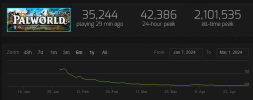
Big upfront sales aren't great metrics for a titles success or longevity, and more evidence of a successful marketing campaign ahead of release.
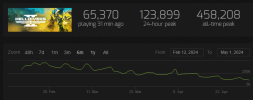
Here we see a random game get a huge lift...
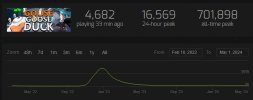
Understanding indie title performance needs more consideration. Big single-point sales numbers aren't in themselves a challenge to the "AAA model".
I mean you can go back to Wolfenstein or even the other side scroller they made. They all sold very well for the time. I think doom may have been the last big shareware hit but I am not sure. I was born in 81 so I was only 12 when it came out lolWay back then, when I definitely wasn't a year older than you!
But yes, agree, there's always been hits from smaller teams. At five core people, I'm not sure that id was that small for 1993 though. They also had a string of shareware hits behind them and plenty of previews showing off Doom's groundbreaking graphics. Doom was also at retail fairly quickly.
Was it the last and biggest shareware hit? Early 90's PC gaming and shareware weren't quite the same scene in the UK. My friends all had Amigas. My enemies had Atari STs.
isn't that true for AAA games too? Specially GaaS games.This was asked on EG and it's worth noting here...
View attachment 11231
Big upfront sales aren't great metrics for a titles success or longevity, and more evidence of a successful marketing campaign ahead of release.
View attachment 11233
Here we see a random game get a huge lift...
View attachment 11234
Understanding indie title performance needs more consideration. Big single-point sales numbers aren't in themselves a challenge to the "AAA model".
Halo Infinite lost a huge part of its players base more than 2 years ago.
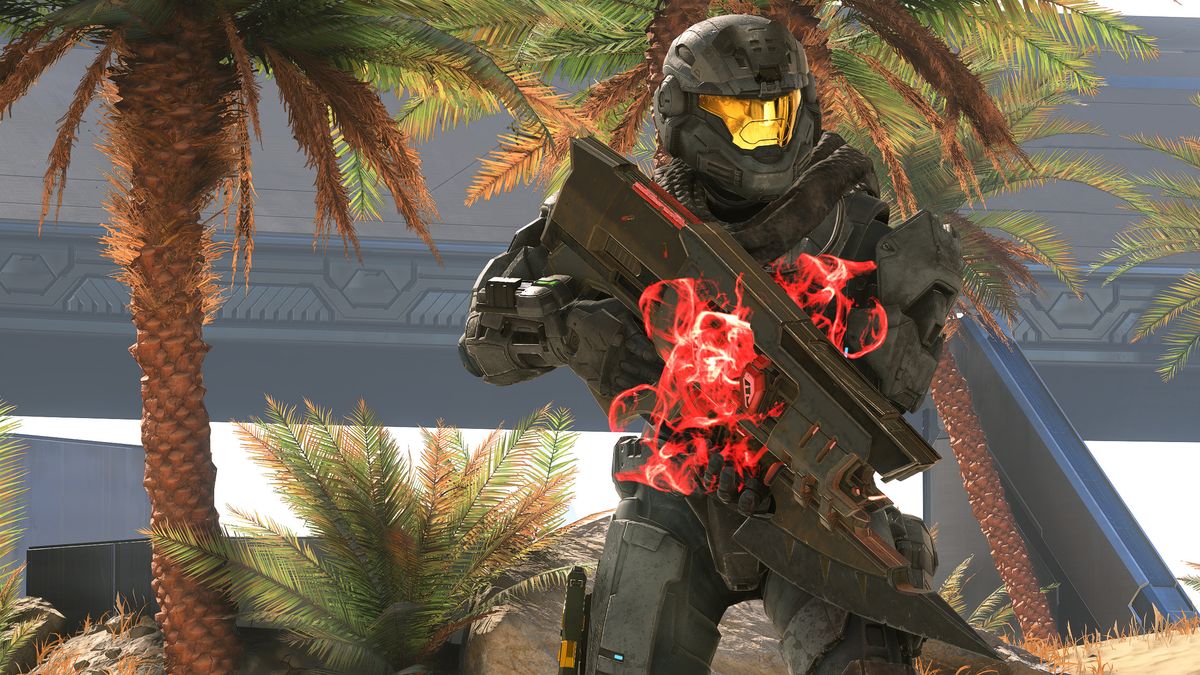
Halo Infinite player counts drops below The Master Chief Collection on PC
343's latest can't stop shedding players
Diablo IV was selling in droves, but lost loads of players. At some point they had 4000 concurrent players on Steam, although I guess Diablo IV most reliable numbers should come from Battlenet. There were rumours saying that D4 had lost 99% of its player base.
I guess Baldur's Gate 3 lost a lot of players too, but it's still going strong --my intuition and 'trust me bro' take.
When you buy games like Call of Duty Modern Warfare like I did a year ago, you might end up leaving them after a while. Once I finished the campaign I stopped playing the game. A decent campaign btw.
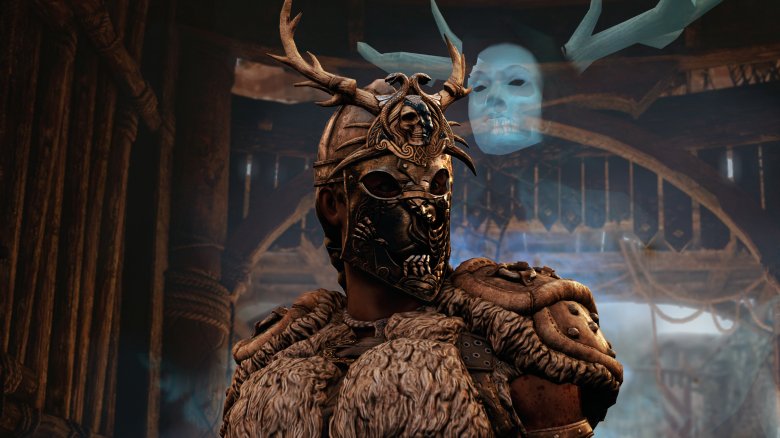
Games That Lost Almost All Of Their Playerbase Within Months - SVG
These are games that had a chance, but lost their audience due to technical problems, lack of innovative content, and overall poor planning.
I think AAA gaming is experiencing a decline as of late. Despite gaming get more and more popular and out pacing both the music and movies industry together. These non AAA games are about the fun, the passion or a very original idea, and that's good for gaming.
The investors of AAA games have been laughing their way to the bank regardless. But the industry seem to be changing, kinda returning to the 90s where games just dont want to convert players into addicts by artifically forcing addiction into them not because you get addicted to those games because they are fun but 'cos they try to use psychology to make you an addict and keep engaged in the game -well, that's what you said months ago.
oh man that had to be quite the rivalry, say Manchester United vs Liverpool. A cousing of mine had an Amstrad, maybe? -it was one of those, but I think it was Amstrad. I found that keyboard with some extras quite fascinating, just by looking at the keys and touching them.Was it the last and biggest shareware hit? Early 90's PC gaming and shareware weren't quite the same scene in the UK. My friends all had Amigas. My enemies had Atari STs.
Shareware games were very popular, that's how I discovered the original Doom in early 1996, via a CD disc with shareware, and Hexen or Heretic.... Good games, but Hexen gave me that nauseous feeling -can't remember how to type it in english- and I wanted to vomit -motion sickness?-.
I played Doom's shareware more than any demo ever. I even modified some of the maps with a map editor despite the fact that my english and my knowledge of the tool was very limited -no manuals, I just learnt from trial and error and looking at the properties of the default native Doom maps.
The moral here is that you had to start somewhere, it's an ants job. Doom became an AAA game over time but it had humble beginnings.
Many AAA games just fight for your time. But the offer is so ample nowadays that I don't know how that's sane for them and for the player. I mean, I don't care anymore, I play what I want except if I don't have money to play a game I'd like to have.
And even games that are well below their peak days like the wonderful Divinity Original Sin 2 can make you return to them 'cos of the many high quality mods they have. I put more than 600 hours in Divinity because of mods. The difference in this case is that it's you who want to play that game, not that the game wants to play tricks with your mind and take your time.
arandomguy
Regular
Regarding the indie thing I think it's keeping in mind the idea of "survivorship bias" in terms of the amount of success against the sheer volume of indie titles these days. As such I'm not sure if larger companies can really look towards indie games as a viable model. If gamers want them to follow indies what are they really saying? Release 100 games annually at low budgets and just hope for some of them to develop into a concrete project and then for one to go "viral?"
As for the AAA discussion I think looking at AAA as a moving target relative to the industry might not be reflective of what is actually meaningful to the audience. The floor (well really the middle) of gaming has risen quite a lot of the years with the available tooling and resources to mid size and even smaller projects. We're basically at a point in which lower budget games to many people have good enough visuals, scope, content, polish, and etc. A lot of these indie successes would've been way worse in those areas relative to AAA games in the past if they were viable projects at all.
As for the AAA discussion I think looking at AAA as a moving target relative to the industry might not be reflective of what is actually meaningful to the audience. The floor (well really the middle) of gaming has risen quite a lot of the years with the available tooling and resources to mid size and even smaller projects. We're basically at a point in which lower budget games to many people have good enough visuals, scope, content, polish, and etc. A lot of these indie successes would've been way worse in those areas relative to AAA games in the past if they were viable projects at all.
Yesisn't that true for AAA games too?
Depends on the game. The typical GaaS grow over time if successful.Specially GaaS games.
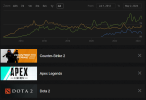
Because it was considered rubbish.Halo Infinite lost a huge part of its players base more than 2 years ago.
I bought it but don't play it because I think it sucks. As did a lot of other people it seems because it too tanked.Diablo IV was selling in droves,
From a big publisher perspective, a PalWorld or a Manor Lords isn't anything like as attractive as a CS2 or AL or Dota, which are constant ongoing returns on that investment (assuming players equate to ongoing revenue via battle passes, cosmetics etc).
Johnny Awesome
Veteran
Halo wasn't considered rubbish. It's like an 8.3 on metacritic. It's also a lot more played on GP than Steam.
My bad. Must have been some other game that came up with a 4.something when I Googled.Halo wasn't considered rubbish. It's like an 8.3 on metacritic.
For a look at Steam games and players and trends, GP doesn't really matter. Halo completely tanked on Steam. If it wasn't because it was rubbish, there'd need be some other explanation. That's the kind of thing we need to look at, player curves of different games, to see if AAA really is being challenged or not.It's also a lot more played on GP than Steam.
Some of these successes are a bit fad-based. Not to say they dont deserve any kind of success(Palworld excluded), but their actual successes have clearly been carried by a sort of mob-esque hype train. Twitch can be a big part of it, as it only takes like a couple big streamers to spend some time in a game, and then all the viewers go and buy the game to participate in the new social phenomenon, and then a bunch of other streamers try and cotton onto the hype and it becomes this big cycle. Twitch overtly tries to promote and encourage these hype trains as well.
There are loads of other very good indie/AA level games getting released that aren't getting 1/100th of the attention of the few bigger hits. And the problem is it's not easy to predict which games will get this sort of rabid hype train popularity, so you cant plan for it or anything. It's not a reliable, merit-based sort of market that AAA devs/pubs can analyze and really learn much from. If anything, something like Helldivers 2 is just going to encourage them even more to just keep trying and spending tons of money on five live service failures in order to hopefully hit on one big success that makes up for it all.
There are loads of other very good indie/AA level games getting released that aren't getting 1/100th of the attention of the few bigger hits. And the problem is it's not easy to predict which games will get this sort of rabid hype train popularity, so you cant plan for it or anything. It's not a reliable, merit-based sort of market that AAA devs/pubs can analyze and really learn much from. If anything, something like Helldivers 2 is just going to encourage them even more to just keep trying and spending tons of money on five live service failures in order to hopefully hit on one big success that makes up for it all.
Johnny Awesome
Veteran
Not really. Steam is only one reference point for AAA viability. 30 million people played Halo Infinite and since MS's goal is to sell GP subs, that's a big number. It kept Xbox/PC GP subscribers happy for at least the 3 months it needed to. The problem is that MS didn't have much in the tank AAA game wise after that for too long afterwards. Things will improve on that front when AAA games start coming out quarterly from Xbox studios. I don't think Steam is much of a platform for Halo to begin with considering that 30 million people played it and it only peaked at 272,000 concurrent users. Most Halo players don't do so on Steam, and it still charts on Xbox regularly in the Top 10 played games 30 months after release. That seems like it was worth making that AAA game.My bad. Must have been some other game that came up with a 4.something when I Googled.
For a look at Steam games and players and trends, GP doesn't really matter. Halo completely tanked on Steam. If it wasn't because it was rubbish, there'd need be some other explanation. That's the kind of thing we need to look at, player curves of different games, to see if AAA really is being challenged or not.
GP is another thing potentially shaking up the traditional AAA model...
As a publisher, should I sink $300 million in a AAA game, or is there better money to be made backing little indies at low cost and spawning proportionally massive returns? These Steam numbers can attempt to inform that decision, where GP doesn't. That requires a different consideration, is $300 million on a game that's then presented on a subscription platform a better business than selling it at $70+?
As a publisher, should I sink $300 million in a AAA game, or is there better money to be made backing little indies at low cost and spawning proportionally massive returns? These Steam numbers can attempt to inform that decision, where GP doesn't. That requires a different consideration, is $300 million on a game that's then presented on a subscription platform a better business than selling it at $70+?
Johnny Awesome
Veteran
Gamers want AAA games. That isn't going away. It's almost pointless to debate when GTA, CoD, Fortnight, etc.... are the black holes of the industry.
This latest journalist bandwagon questioning AAA is just click bait nonsense. Every once in a while a AA squeaks in, but BG3 probably cost $100 million with marketing at the end of the day. Not exactly indie in the traditional sense.
This latest journalist bandwagon questioning AAA is just click bait nonsense. Every once in a while a AA squeaks in, but BG3 probably cost $100 million with marketing at the end of the day. Not exactly indie in the traditional sense.
Similar threads
- Replies
- 68
- Views
- 5K
- Poll
- Replies
- 722
- Views
- 29K
- Replies
- 9
- Views
- 761

